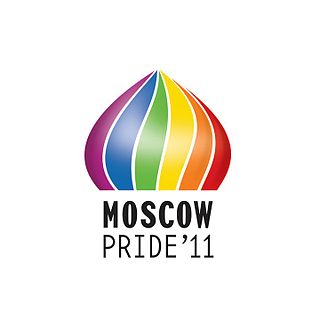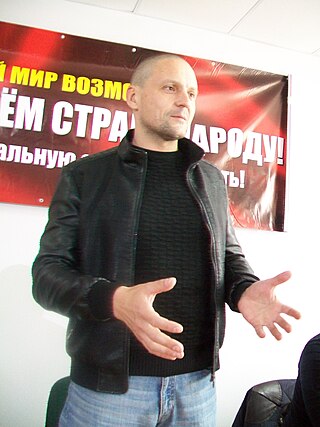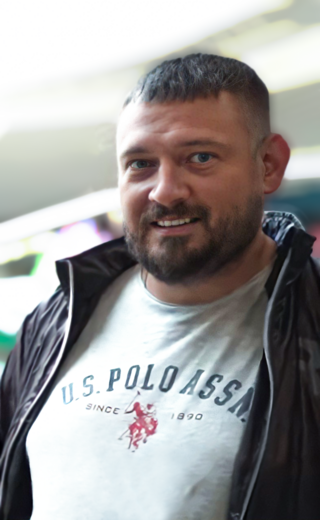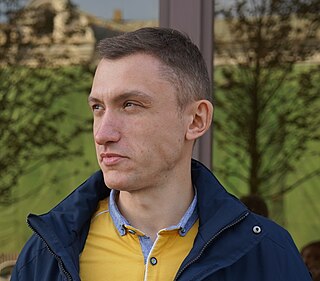
Russia has consistently been criticized by international organizations and independent domestic media outlets for human rights violations. Some of the most commonly cited violations include deaths in custody, the systemic and widespread use of torture by security forces and prison guards, the existence of hazing rituals within the Russian Army —referred to as dedovshchina — as well as prevalent breaches of children's rights, instances of violence and prejudice against ethnic minorities, and the targeted killings of journalists.

Ilya Valeryevich Yashin is a Russian opposition politician who led the PARNAS party from 2012 to 2016, and then its Moscow branch. He was also head of the Moscow municipal district of Krasnoselsky and former chairman of the Council of Deputies of the Krasnoselsky district from 2017 to 2021.
In 2011, the then Algerian president Abdelaziz Bouteflika lifted a state of emergency that had been in place since the end of the Algerian Civil War in 2002, as a result of the Arab Spring protests that had occurred throughout the Arab world.

Oman is an absolute monarchy in which all legislative, executive, and judiciary power ultimately rests in the hands of the hereditary sultan, and in which the system of laws is based firmly on the monarchs made laws. Although a report by the U.S. State Department, based on conditions in 2010, summed up the human rights situation in the country by asserting that the government "generally respected the human rights of its citizens,", several international human-rights groups have described the state of human rights in Oman in highly critical terms. Article 41 of Oman's statute (constitution) criminalizes any criticism of the sultan, stating that "the sultan's person is inviolable and must be respected and his orders must be obeyed".

Moscow Pride is a demonstration of lesbians, gays, bisexuals, and transgender persons (LGBT). It was intended to take place in May annually since 2006 in the Russian capital Moscow, but has been regularly banned by Moscow City Hall, headed by Mayor Yuri Luzhkov until 2010. The demonstrations in 2006, 2007, and 2008 were all accompanied by homophobic attacks, which was avoided in 2009 by moving the site of the demonstration at the last minute. The organizers of all of the demonstrations were Nikolai Alekseev and the Russian LGBT Human Rights Project Gayrussia.ru. In June 2012, Moscow courts enacted a hundred-year ban on gay pride parades. The European Court of Human Rights has repeatedly ruled that such bans violate freedom of assembly guaranteed by the European Convention of Human Rights.

Alekseyev v. Russia is a case before the European Court of Human Rights concerning the prohibition of the 2006, 2007 and 2008 Moscow Pride gay rights marches in Russia's capital. The case was brought by Russian LGBT activist Nikolay Alexeyev, organiser of the marches, who claimed the banning of the marches had violated Article 11 of the European Convention on Human Rights. He claimed furthermore that he had not received an effective remedy under Article 13 against the violation of Article 11, and that he had been discriminated against by the authorities in Moscow under Article 14 in their consideration of his applications to hold the marches.
The 2011 Azerbaijani protests were a series of demonstrations held to protest the government of President Ilham Aliyev. Common themes espoused by demonstrators, many of whom were affiliated with Müsavat and the Popular Front Party, the main opposition parties in Azerbaijan, included doubts as to the legitimacy of the 2008 presidential election, desire for the release of political prisoners, calls for democratic reforms, and demands that Aliyev and his government resign from power. Azerbaijani authorities responded with a security crackdown, dispersing protests and curtailing attempts to gather with force and numerous arrests.
The Hijab protests in Azerbaijan are a consequence of changes in the formal and social aspects of Azerbaijan with the banning of the hijab in schools and universities. The hijab ban led to protests by some religious activists and to their subsequent arrests, due to their opposition to the new laws.

The 2011–2013 Russian protests, which some English language media referred to as the Snow Revolution, began in 2011 and continued into 2012 and 2013. The protests were motivated by claims of Russian and foreign journalists, political activists and members of the public that the election process was fraudulent. The Central Election Commission of Russia stated 11.5% of official reports of fraud could be confirmed as true.

Sergei Stanislavovich Udaltsov is a Russian left-wing political activist. He is the unofficial leader of the Vanguard of Red Youth (AKM). In 2011 and 2012, he helped lead a series of protests against Vladimir Putin. In 2014 he was sentenced to 4¹⁄₂ years in a penal camp for organizing the May 2012 protest which ended in violence between the police and demonstrators.
The following is an incomplete timeline of events that followed the Bahraini uprising of 2011 from September 2012 onward.
The Bolotnaya Square case is a criminal case by the Investigative Committee of the Russian Federation on account of alleged mass riots and alleged violence against the police during the "March of the Millions" on May 6, 2012 on the Bolotnaya Square in Moscow. The demonstration was one of the biggest protests in Russia since the 1990s. By the number of accused, 37 persons, it is currently the largest criminal case against participants of public demonstrations in modern Russia.
Mikhail Aleksandrovich Kosenko is a Russian activist who is a defendant in the Bolotnaya Square case. A participant in a protest against Russian President Vladimir Putin that took place in Bolotnaya Square in Moscow on May 6, 2012, the day before Putin's third-term inauguration, Kosenko was charged with participating in “mass riots” and with “threatening the life or health of a representative of authority.” Although Kosenko and his fellow defendants in the case, Artiom Saviolov and Vladimir Akimenkov, professed their innocence and were backed up by ample video evidence, they were found guilty, with Kosenko sentenced to forced psychiatric treatment.

Alexey Vladimirovich Gaskarov is a Russian social activist and economist who has been a major figure in the democratic, left-wing opposition to the regime of Vladimir Putin. He was a leader of the Russian antifascist movement, and a member of the Coordinating Council of the anti-Putin opposition. He became famous as a prominent critic of the government's destruction of woodland.
Yaroslav Gennadievich Belousov is a Russian political-science student who was a participant in the May 6, 2012, Bolotnaya Square protest against President Vladimir Putin and who has been imprisoned since June 9, 2012, as a result of his participation in the protest.
The 2010 Manezhnaya Square riot trials resulted in verdicts against Igor Berezyuk, Kirill Unchuk and Ruslan Khubaev for violent clashes in Moscow. Each was a member of The Other Russia party, and found guilty on charges such as inciting hatred and organizing the December 11, 2010 Manezhnaya Square riots. Berezyuk was also charged with assaulting a police officer. Human rights groups have argued that the three are political prisoners, and that their imprisonment is chiefly the result of their involvement in the unregistered Russian opposition party, Other Russia.

Ildar Ildusovich Dadin also known by his nom de guerreGandhi (Ганди) is a Russian activist, accused of violent acts and derailing during demonstrations and hence constantly receiving increased attention from the authority. He is the first person to spend one year in a penal colony solely for his activity.

Sergei Leonidovich Tikhanovsky, also transliterated as Syarhey Leanidavich Tsikhanouski, is a Belarusian YouTuber, video blogger, dissident and pro-democracy activist. He is considered by Amnesty International to be a prisoner of conscience. He is known primarily for his activism against the government of Belarus's long-serving president, Alexander Lukashenko. In May 2020, he announced his intention of running for the 2020 presidential election, but he was arrested two days after the announcement, and his wife Sviatlana Tsikhanouskaya then ran in place of him as the main rival to Lukashenko in the contested election.

Konstantin Aleksandrovich Kotov is a Russian software engineer and political activist. In September 2019, he was sentenced to four years in prison for participating in unsanctioned protests and was declared a prisoner of conscience by Amnesty International. After a public outcry, his sentencing was reviewed and reduced. He was released from prison in December 2020.

On Amendments to the Criminal Code of the Russian Federation and Articles 31 and 151 of the Criminal Procedure Code of the Russian Federation is a group of federal laws promulgated by the Russian government during the Russian invasion of Ukraine. These laws establish administrative and criminal punishments for "discrediting" or dissemination of "unreliable information" about the Russian Armed Forces, other Russian state bodies and their operations, and the activity of volunteers aiding the Russian Armed Forces, and for calls to impose sanctions against Russia, Russian organizations and citizens. These laws are an extension of Russian fake news laws and are sometimes referred to as the fakes laws.










